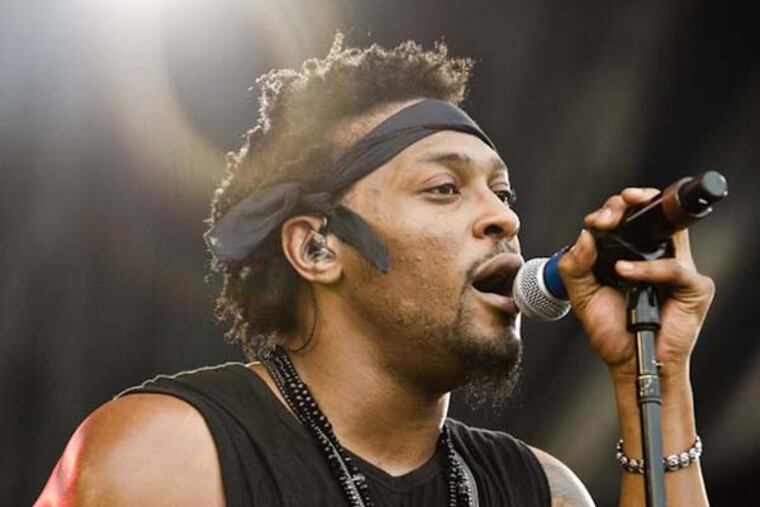Dan DeLuca: D'Angelo's "Black Messiah" is an album for our time
The 14-year wait for D'Angelo's album Black Messiah (RCA ****) ended the night of Dec. 14, with a Beyoncé-esque surprise release. In light of this album's political vibe, it seems Roots drummer Ahmir "Questlove" Thompson was prescient earlier this month, when he called "for musicians and artists alike to push themselves to be a voice of the times that we live in."

The 14-year wait for D'Angelo's album Black Messiah (RCA nolead begins * nolead ends nolead begins *** nolead ends nolead begins nolead ends ) ended the night of Dec. 14, with a Beyoncé-esque surprise release. In light of this album's political vibe, it seems Roots drummer Ahmir "Questlove" Thompson was prescient earlier this month, when he called "for musicians and artists alike to push themselves to be a voice of the times that we live in."
Questlove's call was a reaction to the at-best-sporadic response of the pop music community to events in Ferguson, Mo., Staten Island, N.Y., and elsewhere, events that have led to marches and die-ins in Philadelphia and around the world.
For some reason - maybe because pop acts fear the type of backlash felt by the Dixie Chicks when they opposed the invasion of Iraq in 2003 - pop music has not been in the mood for political confrontation. There have been few signs of engagement with the long history of black protest music, few 2014 analogues to Nina Simone's outraged 1964 track "Mississippi Goddam," James Brown's 1968 anthem "Say It Loud (I'm Black And I'm Proud)," or Marvin Gaye's sorrowful 1971 "What's Going On."
That's where Black Messiah comes in. While it's not a 100 percent political record by any means, it doesn't shy away from the struggle, either.
"Black Messiah is a hell of a name for an album," D'Angelo (real name Michael Eugene Archer) writes in an introduction. "For me, the title is about all of us. It's about the world. It's about an idea we can all aspire to. We should all aspire to be a Black Messiah."
That's a heavy burden for a collection of songs so long in the making it easily could have been delivered stillborn, a victim of its own significance.
Instead, Black Messiah - a totally nondigital enterprise, recorded in old-school fashion on two-inch tape - feels light and free on its feet, a natural extension of D'Angelo's last album, the richly rhythmic Voodoo of 2000, that moves in all sorts of satisfyingly fresh directions. It takes musical cues from Sly & the Family Stone's dense, dark 1971 There's A Riot Goin' On, and is suffused with many influences: Al Green's fluttery Memphis soul, Parliament Funkadelic, and Jimi Hendrix's psychedelic guitar freakouts.
There are tender moments, such as the Spanish-guitar romance "Really Love" and Delfonics-worthy closing ballad "Another Life." And there are even flashes of humor. In "Back To the Future," D'Angelo jests about his onetime status as a shirtless lust object before substance abuse contributed to his epic layoff: "If you're wondering what kind of shape I'm in, I hope it's not my abdomen you're referring to."
But the songs that hit hardest on Black Messiah are those that most powerfully evoke current tensions among citizens who feel that neither economic nor racial justice is being served in a divided America.
That tone is set with "1000 Deaths," which begins with the voice of a preacher evoking a Biblical "Black revolutionary messiah." Over a chugging, militant groove, the 40-year-old songwriter - who wrote Black Messiah with the assistance of P-Funk singer Kendra Foster and A Tribe Called Quest rapper Q-Tip - prepares for battle. "A coward dies a thousand times," he sings, his voice manipulated so you have to listen hard. "But a soldier dies only once."
Black Messiah most chillingly - and poetically - expresses anger with too-slow progress toward equality on "The Charade." Its chorus contains the album's most often-quoted lyric about racial violence and frustration. "All we wanted was a chance to talk, 'stead we only got outlined in chalk," D'Angelo sings, in his most Sly-like voice, managing a sinister sneer. "Feet have bled a million miles we've walked, revealing at the end of the day, the charade."
Black Messiah includes some music that had leaked as far back as 2006. But D'Angelo's move to drop it now is clearly intentional. Maybe Questlove knew it was coming when he issued his call to arms, or maybe his argument persuaded D'Angelo that now was the time to stop tweaking and let go. Whatever the case, there's no question Black Messiah speaks loudly to the here and now.
215-854-5628
@delucadan
A longer version of this review appears on Dec. 21 in Dan DeLuca's column "In the Mix."